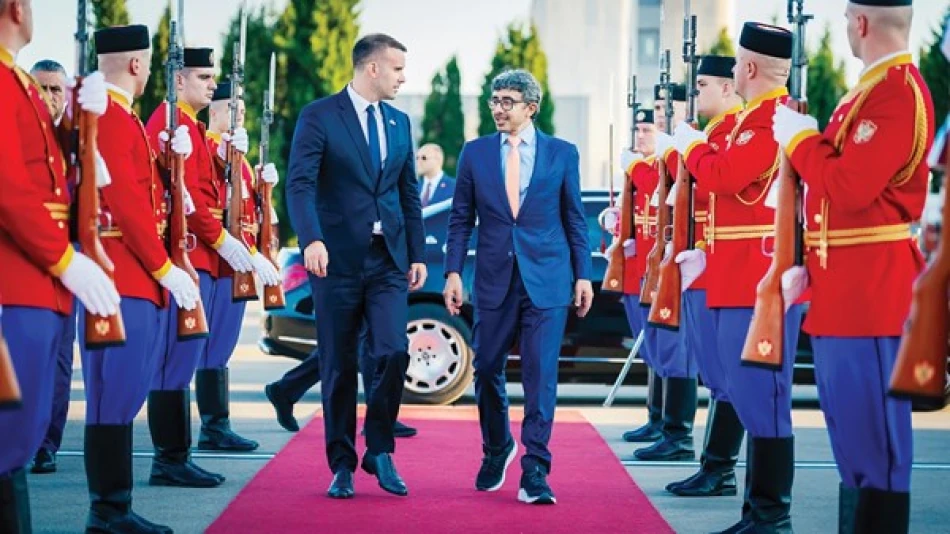
UAE's Diplomatic Push: Strengthening Ties with Balkan Nations
UAE Deepens Balkan Ties as Sheikh Abdullah Meets Montenegro's Leadership
The UAE is strengthening its diplomatic and economic footprint in Southeast Europe, with Foreign Minister Sheikh Abdullah bin Zayed Al Nahyan meeting Montenegro's Prime Minister Milojko Spajić in Podgorica to explore new partnerships across energy, trade, and investment sectors. The high-level talks signal Abu Dhabi's growing interest in the Balkans as a gateway to European markets and underscore Montenegro's appeal to Gulf investors seeking diversification beyond traditional Western partnerships.
Strategic Partnership Beyond Traditional Alliances
During the working visit to Montenegro's capital, Sheikh Abdullah emphasized the UAE's commitment to building "a solid foundation of advanced and prosperous relations" with Montenegro and the broader Balkan region. The discussions covered cooperation in renewable energy, food security, and investment opportunities—sectors where the UAE has demonstrated significant expertise and capital deployment globally.
The meeting reflects a broader trend of Gulf states expanding their influence in Europe through smaller, more agile partnerships. While the UAE has established strong ties with major European economies, Montenegro offers unique advantages as an EU candidate country with growing infrastructure needs and a strategic position along the Adriatic coast.
Economic Implications and Investment Potential
Energy Transition Opportunities
Montenegro's focus on renewable energy aligns perfectly with the UAE's clean energy ambitions. The Gulf state has invested heavily in renewable projects worldwide through entities like Masdar, and Montenegro's mountainous terrain and coastal position offer significant potential for wind and solar development. This partnership could serve as a model for UAE investments across the Balkans, where energy infrastructure modernization remains a priority.
Food Security and Trade Corridors
The emphasis on food security cooperation comes at a time when global supply chains remain vulnerable to geopolitical disruptions. Montenegro's agricultural sector, while modest, could benefit from UAE investment and technology transfer, while potentially serving as a logistics hub for Gulf food imports into European markets.
Broader Regional Strategy
This diplomatic engagement follows a pattern established by other Gulf states, particularly Saudi Arabia and Qatar, in building relationships with Balkan nations. The region offers several advantages: EU accession prospects, lower entry barriers for investment compared to established EU markets, and governments eager for foreign capital and expertise.
For Montenegro, which has faced economic challenges and seeks to diversify its international partnerships beyond traditional European allies, the UAE represents a valuable source of investment and technological know-how. The presence of Said Mubarak Al Hajri, Chairman of Emirates Pharmaceutical Industries, at the talks suggests potential collaboration in healthcare and pharmaceutical sectors as well.
Looking Ahead
While specific investment commitments were not announced, the high-level nature of this visit—with multiple UAE officials and Montenegro's senior leadership participating—indicates serious intent from both sides. The UAE's track record of following diplomatic engagement with concrete investments suggests Montenegro could see significant Gulf capital flows in the coming months, particularly in infrastructure and renewable energy projects.
This partnership also positions Montenegro as a potential regional hub for UAE business interests in the Balkans, leveraging its improving infrastructure and EU candidacy status to attract further Gulf investment across Southeast Europe.
Most Viewed News

 Layla Al Mansoori
Layla Al Mansoori






